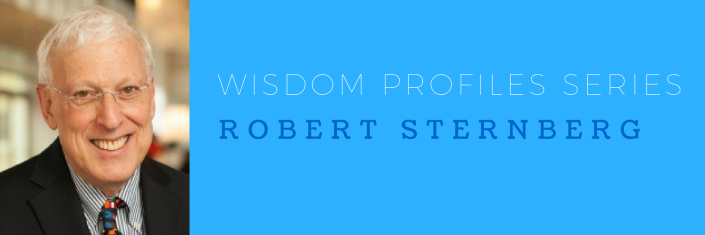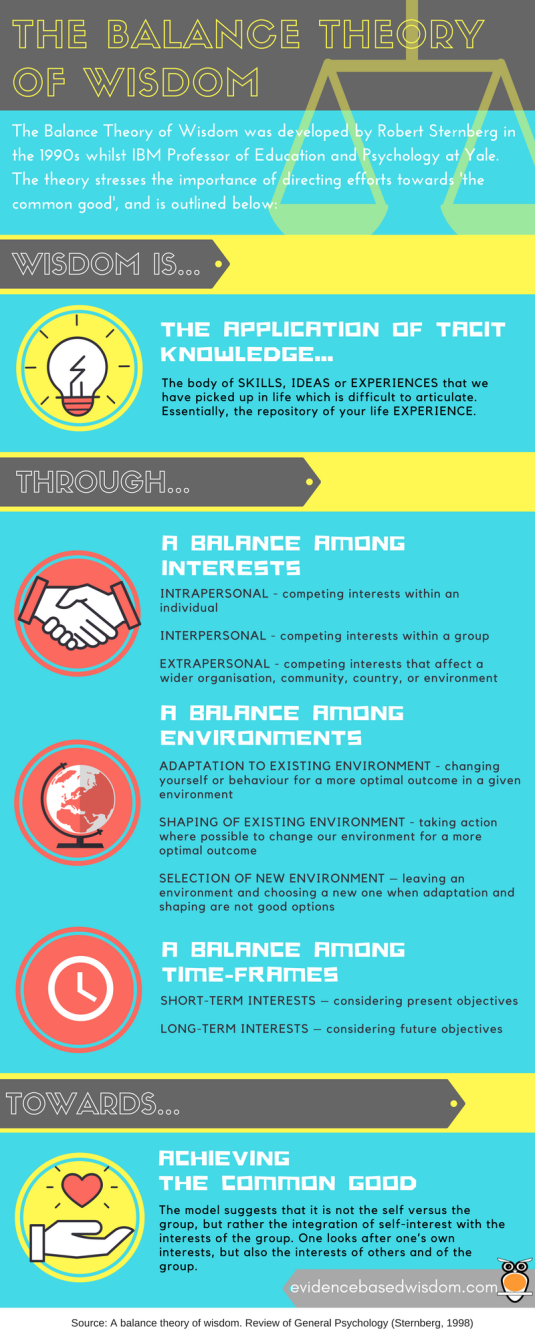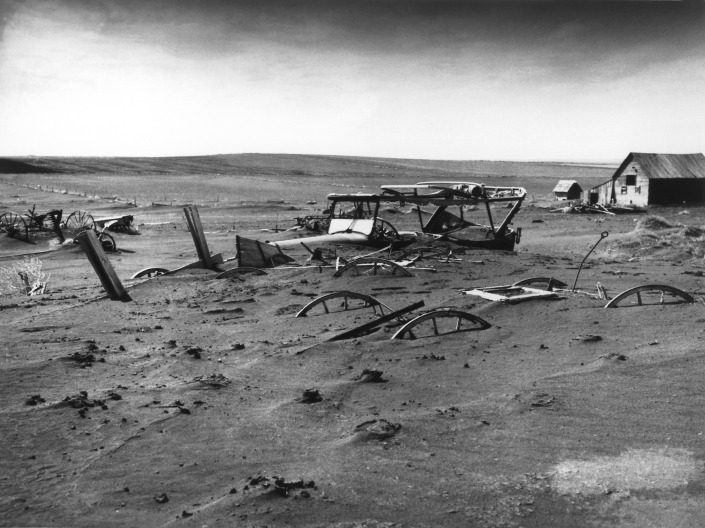
Image Credit: Jason Koski/University Photography, Cornell
On Wisdom and Foolishness
Robert Sternberg, a veritable polymath of psychology, is Professor of Human Development at Cornell University. A former president of the American Psychological Association, he has developed successful theories of intelligence, creativity and even love. In the field of wisdom research, he is renowned for his Balance Theory of Wisdom. Click here to read a key paper in which he argues that universities place too much value on intelligence and ignore the importance of creativity and wisdom in education, proposing that a synthesis of wisdom, intelligence and creativity would better prepare students to maximize their positive future impact in the world.
Following his recent talk at The Center for Practical Wisdom Research Forum 2017 at the University of Chicago, entitled ‘Appointment in Samarra: Are We Rushing to Create a Society of Smart (and Not So Smart) Fools?’, evidencebasedwisdom was able to catch up with him and pick the brains of one of the field’s founding fathers and most outspoken advocates.
Do you have a definition of wisdom that you find the most helpful in your work?
One’s use of one’s knowledge and skills to help foster a common good; by balancing one’s own with others’ and with higher interests; over the long as well as the short term; through the infusion of positive ethical values.

You have said before that many of the assessment tests currently in use, such as SATS, might be doing more damage than good. How might these tests actually be hurting us?
They are reasonable tests of narrow academic skills. But this is a sad commentary on our schools. Regrettably, many if not most of the people who have succeeded through the current system did so by their SAT-type skills and like everyone else, they are attracted to and favor people like themselves. So we end up with successive generations of leaders who are analytically smart, but lack creativity and wisdom.
So we end up with successive generations of leaders who are analytically smart, but lack creativity and wisdom.
At the moment, our leadership isn’t even analytically smart — a backlash by the people who feel they have been screwed by the academic elites of the country. So the system is starting to crash and burn because of the foolishness of some of the high-SAT types. Unfortunately, this problem extends to both political parties – not just one of them.
Is there any research to suggest that you can teach for wisdom?
We have done some research on teaching for wisdom. Of course you can teach for wisdom. Ask anyone about a few key role models who have transformed their lives. I have some and I bet you do too. Our American history curriculum, which we designed to teach wisdom, suffered from two flaws. It was too hard, and it was too hard for teachers to teach who were unfamiliar with the concept of teaching for wisdom. One mostly develops wisdom through role modeling or through books (such as, I hope, my book Psychology 101 1/2).
You have developed instruments to improve the applications process for university undergraduates. How can we change universities into places that, post-successful application, go on to produce wise leaders?

First, we start taking wisdom seriously as a set of skills we want to develop. That will be hard, because university professors are highly selected for IQ, somewhat selected for creativity, and not selected for wisdom at all. The three attributes do not necessarily go together, and often people with high IQs are fools — that is, they are unrealistically optimistic about their own ideas; egocentric; falsely omniscient; falsely omnipotent; falsely invulnerable; and ethically disengaged.
Often people with high IQs are fools — that is, they are unrealistically optimistic about their own ideas; egocentric; falsely omniscient; falsely omnipotent; falsely invulnerable; and ethically disengaged.
Worse are people with low IQs who are fools. A lot of them are running around in Washington DC right now, up to the top. In my book, What Universities Can Be (Cornell, 2016), I describe in detail how to create a university that promotes the development of active concerned citizens and ethical leaders.
You frequently cite many of the negatives of the modern world – war, climate change, inequality etc. as examples of how wisdom is sorely lacking in our society. What about many metrics that have improved in recent years across the planet – literacy, extreme poverty, standard/cost of living, infant mortality, medicine, life expectancy etc.?
Yes, many things have improved. I agree. But I think what happened at the Grenfell Tower in London ought to be a warning. We are too concerned with “means.” Things have improved on average, but many people have been left behind. The world has improved greatly for the top 1% or even top 20%. Consult this chart:
Most of the world is being left behind. That is how fools and authoritarian knaves can be elected to the highest political offices. The people who have been left behind rebel, only to discover that the person they elected played them for suckers. Sadly, many of them will not even realize that.
You have said in the past that wisdom is all about ‘doing the right thing.’ How is wisdom different from simply ethics?
Ethics is part of wisdom, as shown in the definition above. Someone can be ethical but not wise but someone cannot be wise without being ethical.
Considering a century that just gave us what looks like an increase in intelligence but a decrease in wisdom, are you hopeful about the future?
At the moment I’m not as hopeful as I would like to be. In the US, the Republican Party has shown itself to have many leaders who are cowards and who are amoral con artists who talk the talk of morality while failing to walk the walk. The Democratic Party has leaders who have really good ideas for the last century. But they need to move over for the next generation, and so far they are not. Their message is a warmed over 20th century message that probably was good in the time of the New Deal.

The current government is anti-education, anti-science, anti-reason, pro-discrimination, pro-prejudice. I am hoping I can restore the optimism I felt in earlier years. I’m hoping that the generations of my children (I have 2 older children and 3 younger ones of different generations) can do better than my generation has done.
You mentioned in your talk at the Wisdom Research Forum 2016 that a lot of research is ‘…is analytically strong, but didn’t matter’. How do we decide which questions/challenges matter?
At this point, things in this country are going steeply downhill. Every day brings more outrages and overt challenges to democracy. We need research that can be put into practice and that will save our civilization before it is too late. This may sound Cassandra-like, but I think that’s where we were. We are dealing with hugely serious problems — nuclear annihilation, gradual disappearance of liberal values, an upper class that cares only about itself. I’m not sure how long we can go on like this.
Every day brings more outrages and overt challenges to democracy. We need research that can be put into practice and that will save our civilization before it is too late. This may sound Cassandra-like, but I think that’s where we were. We are dealing with hugely serious problems — nuclear annihilation, gradual disappearance of liberal values, an upper class that cares only about itself. I’m not sure how long we can go on like this.
Publishing articles in journals that a few people read and that have as their main outcome the granting of tenure to the authors seems to me out of tune with the needs of the times.
Which single practical change do you think would lead to the greatest increase in the levels of wisdom in society?
Incorporate teaching for wisdom in the schools — and most important of all — role model it. When we have a president who role-models the opposite everyday, and is proud of it, I’m not sure how far we will get in the near future.
Incorporate teaching for wisdom in the schools — and most important of all — role model it.
What do you think is the most ‘pressing/fruitful’ line of inquiry for the wisdom research community over the next few years?
How to create change in schools and society. NOT how to get papers published to advance careers. Even most wisdom researchers are focused on the latter, and that is not wise.

Why not have a look at the following videos, papers and articles to learn more about Robert Sternberg’s work?
TedXTalk – None of the Above: Why Standardized Testing Fails – In this 2012 talk at TEDxOStateU, Sternberg outlines the many shortcomings of how we assess young people.
Is the U.S. Education System Producing a Society of “Smart Fools”? Scientific American Article – In this article, Sternberg sounds the alarm bell about the pitfalls of narrow academic tests and how they might be hurting rather than helping society.
Why is the World Falling apart? The (Non)-place of Wisdom in Today’s World talk – In this talk at the Center for Practical Wisdom‘s Wisdom Research Forum 2016, Sternberg outlines the urgent need for prioritising wisdom in addressing many of the problems currently facing the world.
EBW article ‘The Balance Theory of Wisdom: It’s All About Doing the Right Thing’ – This EBW post outlines Sternberg’s much-respected wisdom framework in more detail. You can also see an EBW Graphic titled The Balance Theory of Wisdom here.
Academic Intelligence is not enough (Sternberg 2009): Sternberg outlines why we need to think more broadly about intelligence and wisdom in education.
Conversations on Wisdom – Uncut Interview with Robert Sternberg: Sternberg frankly discusses his contributions to the emerging field of wisdom research. The interview was conducted as part of a new documentary film entitled The Science of Wisdom.
Career advice from an oldish not-quite geezer: Interview in The Chronicle of Higher education in which Sternberg provides practical advice gleaned from an illustrious and fascinating career.
Psychology 101 1/2 – The Unspoken Rules for Success in Academia: Sternberg’s 2004 book shares the wisdom accrued over the course of a rich and lively career in many of North America’s leading institutions.
Wisdom: Its Nature, Origins, and Development: Sternberg’s 1990 book is a seminal text in the field of wisdom research, laying the foundation for the growth in the field over the following years.
Why Smart People Do Stupid Things: Sternberg’s 2002 book on the common pitfalls of the highly intelligent.
EBW Animation Series – Defining Wisdom – Sternberg’s Balance Theory of wisdom is detailed in this EBW animation Defining Wisdom.
Robert J. Sternberg site – Visit Sternberg’s own site where you can find up-to-date information on his ongoing research
If you have any thoughts about the interview, please get in touch.
You can contact me at charles@evidencebasedwisdom.com, via the about page or find me on twitter @EBasedwisdom.
Charles